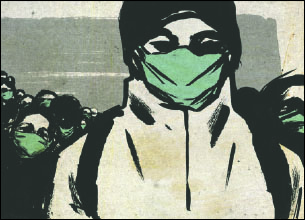
By Dr. Joynicole Martinez
Staff Writer
With the thousands of articles being written and shared across the internet regarding the 2019 novel coronavirus, it seems almost pointless to write another one. But, while there’s some great information circulating there’s also false, illogical and dangerous nonsense being reshared at a rapid rate.
We must stop these ridiculous posts, they put human lives at risk.
No, coronaviruses don’t live in your throat for four days and it can’t be killed with vinegar and salt before it reaches the lungs. Neither will swallowing bleach, taking acetic acid or steroids, or using essential oils, salt water, ethanol or other substances kill the virus.
No, it wasn’t developed in a secret lab.
No, it’s not just rich people who are getting sick.
No, warm weather won’t kill it. The virus is spreading in over 153 countries and is in all 50 United States—hot and freezing.
No, it’s not just affecting old people.
No, being black won’t protect you because “only white people are getting it.”
This is not the first coronavirus to affect human beings. There’s a fatal history behind the claim that blacks are more resistant to diseases like COVID-19.
The 18th-century yellow fever outbreak in the Americas is instructive here. In the 1740s, yellow fever had overtaken coastal port cities like Charleston, S.C. causing delirium, endless vomiting, hemorrhaging, and eventually death. Doctor John Lining recorded his observations about the disease in Charleston after inspecting slave ships and their cargo—including captive Africans—finding that it was almost exclusively white people who were succumbing to the disease. These observations helped reinforce already-stirring beliefs that Africans had some kind of supernatural inoculation to some of the deadliest diseases floating along the American coast.
Lining’s information was consumed and repeated by became Dr. Benjamin Rush, a black doctor and abolitionist who convinced blacks to stay in Philadelphia in 1793 as yellow fever took over the city.
Close to 20,000 people—half of the population—fled Philly while many blacks actually stayed in the city at the request of Rush, who wanted to train them to nurse, care-take, and dig graves for the thousands of people dying of yellow fever.
Since yellow fever originated in mosquitos native to West Africa, the black-immunity concept of the time didn’t take into account how many Africans may have died from the disease in their native lands.
Rush was a brilliant doctor—he would later be called the father of American psychiatry—but bought into an awful lie. Medical theories about black immunity persisted and fortified political and economic justifications for keeping Africans enslaved. The thought was that black people are best suited for chattel labor because of their ability to fight off attacks on their health, though the Philadelphia case disproved it.
When you declare your blackness as a standard against a virus, you not only spread a lie that can get people killed, you spread a stereotype and myth that keeps blacks regarded as “best suited for the use and protection of others.” Stop it.
There are over 200,000 confirmed positive cases of COVID-19 globally. Almost 8,000 people have died. News media carry stories of interest, so the working woman who tested positive isn’t as fantastic a headline as Idris Elba announcing his positive test. But don’t miss the fact that his diagnosis came before he had one symptom—because the hardworking health professionals that are charged with tracking and notifying the people you may infect found him, informed him, and tested him after he was exposed. This allowed him to isolate quickly and stop the spread.
Presuming you’re healthy puts others at risk. According to the WHO, “It takes between 2 and 10 days before people who are infected become sick and develop a fever.” Social distancing works. Moreover, in many states it’s mandated and fines are imposed for those that don’t comply.
Mecklenburg county Public Health Director Gibbie Harris told county commissioners Tuesday evening Charlotte could soon be under a shelter-in-place order much like San Francisco and New York as the coronavirus outbreak escalates. It’s scary, and maybe that’s why we want to believe hype and myth over the truth. But the truth will help us be well. Consider these:
Yes, viruses can change over time. Occasionally, a disease outbreak happens when a virus that is common in an animal such as a pig, bat or bird undergoes changes and passes to humans. This is likely how this novel coronavirus came to be. NO—you don’t have to eat the pig, bat, or bird for it to transmit.
Yes, scientists have begun working on a vaccine, but developing a vaccine that is safe and effective in human beings will take many months or years. Consider this, SARS—another coronavirus—was identified via a 2003 outbreak. We still don’t have a vaccine.
In the meantime, we can slow the spread and keep ourselves and our families as safe as possible.
1. Wash your hands, even more.
2. Sanitize your phone. Use it less in public.
3. Don’t touch your face. Don’t touch your eyes, don’t bite your nails.
4. Don’t use a face mask. Unless you are a health professional or sick.
5. If you have symptoms, stay home.
6. If you can, stay home anyway. And stop buying toilet paper in droves. It can’t save you.

This was very informative! Thank you Dr. Martinez for correcting the myths.